WDI has marked its 25th anniversary with a video that celebrates its history while also chronicling the important work it continues to do around the world. The Institute also produced a short, biographical video of the life of WDI founder Bill Davidson.
The six-minute video about the Institute features on-camera interviews with Bill Davidson’s son, Ethan Davidson, WDI Board Member Ralph Gerson, former U-M business school dean B. Joseph White and WDI President Paul Clyde. As Gerson said in the video, WDI’s 25th anniversary is an appropriate time to “reflect on what’s been accomplished” and to honor the impactful work performed globally by the Institute’s staff, faculty affiliates and student fellows.
Two of the many long-term projects that WDI has worked on – the Goldman Sachs 10,000 Women initiative in Rwanda and the Aravind Eye Care System in India – are featured in the video.
To honor the Institute’s founder, WDI looked back at Davidson’s life – from childhood to his successful business career and sports team ownership to his noted philanthropic contributions. Davidson was raised in Detroit and graduated from U-M, where he was a member of the track team. He earned a law degree from Wayne State University and after a few years as an attorney took over the family’s struggling glass business.
He turned Guardian Glass into one of the world’s largest glass manufacturing companies, today known as Guardian Industries. He also became one of Michigan’s biggest philanthropists, giving to causes in Detroit, at U-M, throughout southeast Michigan, and Israel. His charitable giving lives on through the William Davidson Foundation.
Davidson also was well known as the longtime owner of the Detroit Pistons basketball team, as well as the Detroit Shock of the WNBA and the NHL’s Tampa Bay Lightning.
WDI today unveiled a new book for its 25th anniversary that commemorates the Institute’s history, leaders, partners and inspiring work around the world.
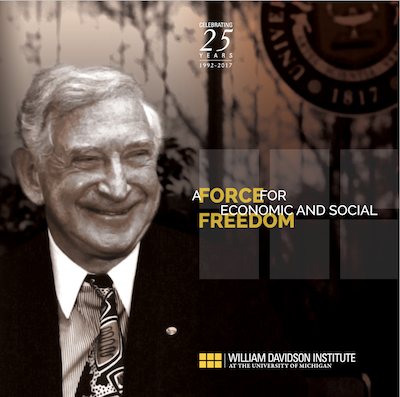 The book, “A Force for Economic and Social Freedom,” recounts the Institute’s founding and the dynamic life of its founder, Bill Davidson. The book also looks at the four people who have led WDI during its 25 years, and how each shaped the Institute in their own unique way.
The book, “A Force for Economic and Social Freedom,” recounts the Institute’s founding and the dynamic life of its founder, Bill Davidson. The book also looks at the four people who have led WDI during its 25 years, and how each shaped the Institute in their own unique way.
Four of WDI’s initiatives – Education, Healthcare, Performance Measurement and Scaling Impact – are profiled, including the goals of each and examples of some of their successful work.
The book also reflects on WDI’s 25-year engagement with the University of Michigan community – its faculty and students. Some of the Institute’s many collaborations with U-M faculty are featured, as are the numerous global internships and MBA student teams that WDI has sponsored over the years. The uplifting stories of several past WDI interns and how the opportunity to work abroad changed their lives, also can be found in the book.
The WDI Global Impact Speaker Series is discussed in the book, as well as two specialty areas of the Institute – case publisher WDI Publishing and the news and analysis site NextBillion.
The book concludes with a look to the future, and what the next 25 years and beyond hold for WDI.
The Institute received design and editorial assistance for the book from Michigan Creative, U-M’s in-house agency. Click here to download an electronic version of the book.

Image courtesy of Walmart.
Note: WDI’s recent research and case studies involving Walmart can be found here.
WDI Publishing has released a new business case study that examines Walmart’s successes and challenges in its efforts to incorporate smallholder farmers and female artisans from developing countries into its global supply chain.
“Walmart and Small Producers from the Developing World: Linking Demand with Supply,” which is free to download, studies two specific programs the retail giant created to target local producers. One was the Direct Farm program, which sourced fresh fruits and vegetables from farmers in developing countries. The other, Empowering Women Together, sourced handmade clothing, jewelry, home goods and other products made by women-owned businesses and sold online by Walmart.
It was written by Ted London, vice president of WDI’s Scaling Impact Initiative, and Colm Fay, program management analyst for Scaling Impact.
The case follows Walmart’s Chief Sustainability Officer Kathleen McLaughlin and two of her associates as they review the programs and consider whether modifications would improve their ability to work with local producers. The three also wondered if the lessons learned by Walmart about small and medium producer capabilities, global standards, partnership development, and funding requirements would be useful to others also trying to engage producers from the developing world.
If these small businesses were to become reliable Walmart suppliers, they would need to build significant capacity. That would require a considerable investment of time and money, flexibility and collaboration, the company determined. However, Walmart managers believed that achieving this could benefit the company, enhance how customers view the company’s environmental and social efforts, and improve the livelihoods of small producers worldwide.
So the question the company faced was, given the modest successes and the remaining challenges, should Walmart halt these efforts or continue to invest? And if they persisted, what changes should be considered?
Fay said the teaching case “prompts students to not only consider how both social and financial value might be prioritized differently across projects by companies such as Walmart, but how they then need to identify the appropriate execution approach for these strategies to achieve the outcomes they intend.”
The case originates from a report that Fay, London and Linda Scott, Emeritus DP World Chair for Entrepreneurship and Innovation at Saïd Business School at the University of Oxford, produced and presented at the 7th Annual Global Entrepreneurship Summit 2016. The report – “Incorporating Small Producers into Formal Retail Supply Chains” – takes a deeper look at how companies might prioritize different sourcing scenarios for small producers from developing countries.
This is the second case study about Walmart to be produced by WDI Publishing. In 2015, Fay and London – with assistance from a team of graduate students from the University of Michigan’s Ross School of Business and the Ford School of Public Policy – wrote a case on the evolution of a global cross-sector partnership between the retailer and the United States Agency for International Development (USAID). The case examined what had been learned – both positive and negative – during the 15-year collaboration between the two global organizations.
The case, “Walmart and USAID: The Evolution of a Global Cross-Sector Partnership,” focused on partnerships that sought to engage smallholder farmers in the developing world, and highlighted examples from Honduras, Guatemala, Rwanda and Bangladesh. It explored the ways in which these collaborations occurred, how they were supported by the partners, and the level of success achieved as measured by Walmart, the Walmart Foundation, and USAID.
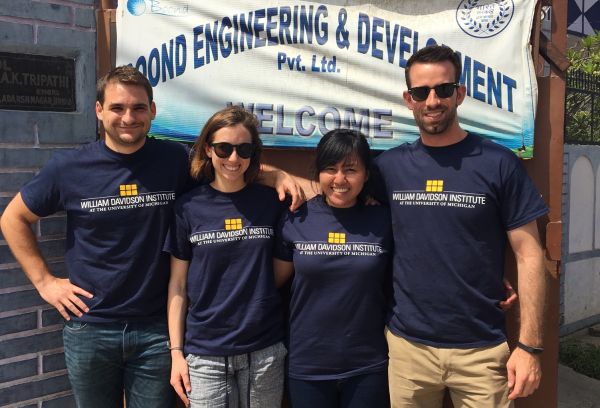
As their 2017 MAP project, U-M students Florian Eizaguirre, Amelia Harris, Matilda Narulita and Chris Atkins are advising Boond, a renewable energy firm in India.
Tom Reidy’s previous work experience and core MBA classes this year at U-M’s Ross School of Business have focused on operating a business in the developed world. That’s one reason Reidy is excited to head to South Africa to work for the startup organization, Mbuyu, as part of the school’s annual Multidisciplinary Action Projects (MAP).
“I’m interested in learning how business strategy differs in low-income, or base of the pyramid, markets because the frameworks we learned in our core classes over the last year have focused on developed markets,” said Reidy, a first-year MBA student. “Also, this will be my first time working with a start-up and dealing with impact investing, so I’m hoping to achieve a good understanding of how those things function.”
Mbuyu is working with South African National Parks to protect some of the world’s most critical honey bee ecosystems while developing a business to produce and sell organic honey. The MAP in South Africa is one of 11 student projects organized and sponsored by WDI. The Institute also is providing funding for two additional MAP projects.
MAP is an action-based learning course offered at Ross in which MBA students receive guidance from faculty advisors. Each project requires analytical rigor, critical thinking, and teamwork. Participating organizations receive top-notch deliverables and data-driven recommendations from the teams of students. (Find out more about WDI’s MAP projects over the years here.)
After learning about their projects and conducting secondary research for several weeks, the students then spend two to four weeks working with their organizations in the field.
Carissa De Young, a second-year MBA who is a dual degree student at Ross and the School of Natural Resources, will travel to India with her MAP team to work for GE Power.
“I’m most looking forward to learning more about the challenges in rural areas and how large companies can use their expertise to provide solutions,” she said.
Below is a summary of each WDI-sponsored MAP project.
African Institute of Management (IAM) – Senegal
Advised By: Paul Clyde, WDI and Ross School of Business
Team Members: Paul Miyamoto, Kaitlyn Fischer, Bradley Rollins
Founded in 1996, the Institut Africain de Management Group (IAM) is one of the leading private business schools in Central and West Africa. IAM is developing a master’s degree program in supply chain. This program will address the needs in Senegal and West Africa generally, by increasing the supply chain management talent available in the region.
The goal of this project is to develop a market entry strategy for a supply chain program at IAM. The team will learn about the program and then conduct competitive analysis and interview businesses that either are or employ potential customers in Senegal.
Aparajitha Foundation – India
Advised By: Paul Clyde, WDI and Ross School of Business; Bob Dittmar, Ross School of Business
Team Members: Diocelyn Batista Rijo, Rachel De Leon, Adam Fitzmaurice, Nancy McDermott
The Aparajitha Foundation is an arm of the Aparajitha Group. It is committed to the cause of creating transformational change in adolescents by using audiovisual technology to deliver life skills training to economically disadvantaged children in India’s Tamil Nadu state.
The MAP team will conduct a market analysis that will enable the creation of a financial model for an overarching ecosystem to support the micro small medium entrepreneurs (MSME) sector in Madurai, India.
Aravind Eye Care System – India
Advised By: Paul Clyde, WDI and Ross School of Business; Thomas Buchmueller, Ross School of Business
Team Members: Kaitie Conrad, Nikita Jambulingam, Siddhi Kaul, Ravi Patel
Aravind Eye Care System is a network of hospitals, clinics, community outreach efforts, factories, and research and training institutes in south India that has treated more than 32 million patients and has performed 4 million surgeries since its 1976 founding.
The student team will work with Aravind’s senior leadership to develop a roadmap for the eyecare system’s future growth.
Banyan Global – Ghana
Advised By: Ted London, WDI and Ross School of Business; Jim Walsh, Ross School of Business
Team Members: Vagisha Goel, Eric Perrin, Adi Singhal, Courtney Tatum
Banyan Global is a development consulting firm that works in five continents. It is implementing a USAID-funded project to increase access, improve efficiencies and expand quality maternal-child healthcare in rural areas. Banyan is working with private maternity home owners who may be nearing retirement on “transformation” options – selling the facility, leasing out the facility, bringing on a partner, bringing on a manager, or bringing on a specialist who will enable the facility to diversify its service offerings.
The MAP team will focus on an in-depth investigation into the the financial constraints and opportunities for private maternity homes in Ghana, with a specific focus on the projected return on specific potential investments, and the feasibility of various credit options to finance those investments.
Boond Engineering & Development – India
Advised By: Ted London, WDI and Ross School of Business; Jane Dutton, Ross School of Business
Team Members: Chris Atkins, Florian Eizaguirre, Amelia Harris, Matilda Narulita
The students will build a strategy around data collection and analysis and finding ways to monetize it. Boond collects a lot of consumer demographic data along with energy usage data from its portfolio of micro-grids in rural communities. It wants to analyze the data and explore ways of sharing its findings to those interested for a price.
CARE International – Egypt
Advised By: Ted London, WDI and Ross School of Business; Jane Dutton, Ross School of Business
Team Members: Andrew Hauser, Colleen Hill, Zack Molnar, Elizabeth Padilla
Working with the Danone Ecosystem Fund, CARE International is working to improve the socio-economic conditions of dairy farmers in Egypt using a collaborative model that engages cooperatives and community development associations in the country.
The MAP students will partner with Danone and CARE International to facilitate access to quality information for dairy farmers to improve their skills and productivity, and develop the institutional capacity, including good governance practices of farmers’ organizations.
GE Power – India
Advised By: Ted London, WDI and Ross School of Business; Sugato Bhattacharyya, Ross School of Business
Team Members: John Barbour, Carissa De Young, Claire Fletcher, Wiles Kase, Christina Lee, Jon McCartney
GE Power provides power generation, energy delivery, and water process technologies to solve issues in local markets.
The student team will develop a go-to-market recommendation for a new set of energy products and services that are focused on providing electricity in emerging markets.
Imperial Health Sciences – South Africa
Advised By: Paul Clyde, WDI and Ross School of Business; Ravi Anupindi, Ross School of Business
Team Members: Jaymon Ballew, Jeremy Egan, Francesco Esposito, Emily Lombardi, Mary Rockas
IHS provides supply chain solutions to the public and private pharmaceutical markets in Africa. It has partnered with several development and global health leaders from the public and private sectors to launch Lulama, an innovative financing partnership that will strengthen independent, community pharmacies in underserved areas, and enable access to quality, life-saving medicines to those who need them most.
The MAP team will assess the Lulama community pharmacy pilot program from the perspective of all the stakeholders for its potential to be a sustainable, scalable and replicable solution, and make recommendations.
ITC Limited – India
Advised By: Ted London, WDI and Ross School of Business; Sugato Bhattacharyya, Ross School of Business
Team Members: Gustavo Calzavara, Rakshit Gupta, Paula Luu, Linh Nguyen
ITC is a major diversified Indian conglomerate that creates multiple drivers of growth by developing a portfolio of businesses in the consumer goods, hospitality, paper, packaging, agribusiness, and information technology sectors.
The MAP team will develop a robust and scaleable business model in the fruits and vegetables space that could lead to a sustainable business that significantly enhances value for farmers in India.
Mbuyu Group – South Africa
Advised By: Ted London, WDI and Ross School of Business; Jim Walsh, Ross School of Business
Team Members: Megan Knoch-Dohlin, Ari Lowell, Tom Reidy, Christine Rickard, Sara Schmidt, Neil Tidwell
Mbuyu Group is working with South African National Parks to protect some of the world’s most critical honey bee ecosystems and strengthen the bee population. The group also hopes to become one of the largest global producers of organic honey.
The student project will develop a comprehensive fundraising communications strategy and materials recommendations to raise $5 million from international funding institutions and individuals. The money raised will support the purchase of 50,000 beehives on behalf of poor communities surrounding the nation parks.
Vayu – Malawi
Advised By: Paul Clyde, WDI and Ross School of Business; Thomas Buchmueller, Ross School of Business
Team Members: Jason Doran, Cazzie Palacios Brown, Maggie Vasquez, Charles Walton
Vayu is a Michigan start-up developing drones to aid medical care such as flying shipments of drugs, blood and other samples to remote villages.
The students will develop a market entry strategy plan for Vayu for Malawi.
Global Fairness Initiative – Nepal
Advised By: Mike Gordon, Ross School of Business; Paul Clyde, WDI and Ross School of Business
Team Members: Molly Hope, Kevin Jones, Julie Smith, Allen Xu
The Global Fairness Initiative promotes a more equitable, sustainable approach to economic development for the world’s working poor by advancing fair wages, equal access to markets, and balanced public policy to generate opportunity and end the cycle of poverty.
The student team will determine a sustainable financial model for Better Brick Nepal, a market-based program that is transforming Nepal’s brick industry by eliminating forced, bonded, and child labor.
Vietnam Partners, LLC – Vietnam
Advised By: Stewart Thornhill, Ross School of Business; Paul Clyde, WDI and Ross School of Business
Team Members: Niall Bachynski, Maddy Bourgeois, Nick Daen, Sara Faurer, Juan Recalde, Aaron Wolff
Vietnam Partners works with companies and investors to build successful businesses that exploit opportunities arising from Vietnam’s accelerating integration into the global economy.
Vietnam Partners in collaboration with the Hanoi School of Business has been requested to set up and lead the development of a Center for Entrepreneurship and Innovation (CEI) and establish a start up venture capital fund.
During the conversation, Sengupta discussed what motivated him to start the solar access venture Boond, which provides clean-energy lighting solutions to 100,000 low-income individuals and small-scale enterprises in rural, northern states of India.
He also talked about the evolution of his business model over the past six years as Boond has gone from a small company offering solar lamps and simple home systems to one that now offers microgrids, mini grids and rooftop solar panels. (Learn more about Boond in this company-produced video.)
Sengupta spoke to U-M students on Nov. 30 at the Ross School of Business. Watch his classroom presentation here and read more about Sengupta and a preview of his talk here.
In a perspective article, WDI President Paul Clyde observes the trend of top business schools establishing institutes and programs designed to help develop businesses that make money and simultaneously provide benefits to society. While Clyde sees merit in the educational endeavor and the business practice, he also believes we must be careful not to undermine the societal impact of for-proft businesses.
As the William Davidson Institute at the University of Michigan (WDI) nears its 25th anniversary next year, I have been looking at how business schools approach development in low- and middle-income countries and noticed an increase in the institutes and programs designed to help develop businesses that make money and simultaneously provide benefits to society at large. Examples include the Social Enterprise Initiative at University of Chicago’s Booth School, the Center for the Advancement of Social Entrepreneurship at Duke’s Fuqua Center, Social Enterprise at Goizueta (Emory University), The Center for Responsible Business at The University of California’s Haas School, and The Social Enterprise Initiative at Harvard. I would also include WDI on this growing list, though social enterprise was not WDI’s focus when it was established in 1992. Of U.S. News and World Report’s top 20 business schools, well over half have some sort of social institute that does work in low- and middle-income countries around the world. Others have created social institutes focused on the United States.
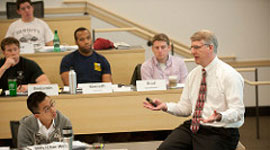
This proliferation of socially oriented institutes within business schools suggests that the business education community sees social enterprise, broadly defined, as an important mechanism for creating change, and perhaps even something that the traditional business subject – for-profit businesses – cannot do. Oxford University’s Skoll Centre for Social Entrepreneurship appears to say just that:
We believe socially entrepreneurial approaches have much to contribute in creating this new market; for rather than pursuing activities that seek to maximise profits at society’s expense, these entrepreneurs put principles ahead of profits for society’s benefit.[1]
This is misleading at least and harmful at worst.
Socially oriented institutes pursue goals that most would agree are worthy – poverty alleviation, environmental sustainability, health provision for the poor, to name a few. It is certainly true that business practices and skills can be used to the benefit of any organization. However, in our zeal within the business education community to pursue these admirable social goals, we risk losing sight of the most powerful mechanisms for affecting economic change: for-profit businesses.
For-profit businesses generate social benefits too. As Adam Smith taught us 240 years ago from a school just a bit north of Oxford, businesses generate these social benefits not because making the world better off is explicitly part of the intention of producers – but because, with a few important exceptions noted below, the pursuit of profits benefits society as a whole. Some of this value accrues to the consumer in the form of “consumer surplus” – the difference between what the consumer pays and the maximum amount the consumer would be willing to pay for the product or service. Some of the value accrues to the producer in the form of “producer surplus”—the difference between what the producer is paid and the lowest amount that the producer would need to receive in order to participate in the transaction. Notably, the value going to producers can—and generally does—get shared with multiple participants on the producer side, including not only investors (debt and equity holders), but also employees and suppliers.
At first blush, this might seem less beneficial than an organization that is deliberately focused on social goals such as poverty alleviation. Such a view, however, misses a major benefit of profit-maximizing ventures. Any company will be attracted to opportunities to increase profits. Companies that identify profit enhancing opportunities will increase their scale, while other companies will jump into the marketplace to compete for the profit opportunities. Both actions lead to growth in output, employment and welfare. Companies with social goals, in addition to or instead of profits, will not have the same impact on their own behavior or on that of others.
Note that a bright line is drawn here between profit-maximizing activities and all other activities, including firms that pursue multiple goals, one of which is profits. This includes social entrepreneurs, organizations pursuing so-called shared value, corporate social responsibility, triple bottom line and myriad other terms, all of which involve a tradeoff of profits for some other goal. For some of these organizations, profits are among the goals, but they are not the only goal. Pursuing another goal in addition to profits requires the possibility of sacrificing some of the potential return on an investment. Such a compromise on the return is, in essence, a subsidy and should be recognized as such. As a result, all things being equal, companies with social goals, in addition to or instead of profits, will not have the same impact on their own behavior or on that of others.
None of this is to say that there isn’t a place for social enterprises. There are some customers who will not be served by purely for-profit activities. An inability to pay can perhaps best be addressed by government provision or by an NGO that doesn’t seek to maximize profits. For example, many services and products within education and healthcare may only be provided by an organization willing to sacrifice some or all of its profits. In these cases, there is a good argument for a social enterprise, and business principles can be applied here just as they are in for-profit enterprises.
However, even in these cases, we must be careful not to undermine profitable activities that, because of the subsidized activities, cease to be provided or are not provided in the first place. It has long been recognized and taught in microeconomic classes that subsidizing products in a low-income economy has a debilitating effect on local businesses trying to produce that product themselves. The classic example of this is agriculture where U.S. policies have often resulted in artificially high prices in the U.S. and thus more output than U.S. consumers are willing to buy. This leads to a problem: the producers (the group the policy was designed to help) can’t sell everything they produce. One solution to dealing with the surplus is foreign aid: the overproduction in the U.S. can be purchased by the U.S. government and then given away to other countries. However, this aid can completely undermine local farmers in the foreign country. I recall teaching this principle one semester in one of my classes and watching a student in the front row become increasingly agitated. She finally spoke up and explained that her family was one of those farmers in a Latin American economy and they had suffered the consequences of this “aid” from the United States. If the tables were turned, and a Latin American firm had tried to offer “aid” to the U.S., the Latin American firm would likely be charged with dumping by the U.S. government.
The risk of undermining the local economy isn’t limited to products. The doctor who flies in to perform surgeries for free is great for those who receive the surgery, but that doctor may unintentionally undermine the ability of the local hospital to charge a price for the same surgery. In doing so, the free surgeon may be putting an institution that provides more complete and continuous healthcare to the community at risk of financial collapse.
In contrast, local businesses that develop models that work in these economies lead to permanent changes in the welfare of a community. Such companies provide a return for investors, jobs for local labor and ready buyers for local suppliers.
Institutes at business schools, including ours, need to keep this in mind when offering programs or developing products to “help” a local community. In general, activities that do not result in continuing subsidies may be less likely to have these harmful effects. For example, assisting in starting up, developing viable business models or providing education might be expected to distort the local economy the least and have a net positive impact. But we should still be very careful. Anything that leads to long-term involvement at a subsidized cost could have a negative net effect.
It is also true that businesses can be harmful. A recent film titled “When Elephants Fight” documents the role of companies in perpetuating the conflicts, rapes and murders that have plagued the Democratic Republic of Congo (DRC) for decades. The companies may not have started the conflict and it may continue without them, but they are participating in transactions of minerals that enable and even encourage this behavior; and they are having a downright evil impact. Humans run businesses. Humans can be evil and so can the businesses that they run. Some of the companies operating in the DRC are an extreme example of the larger category of externalities. Externalities arise when the costs or benefits to a business under or over-state the social costs or benefits. When this happens, the decisions by the business will not coincide with those that are in the interest of society. In such cases, there is a role for governments and/or NGOs.
Thus, my point isn’t that for-profit firms are necessarily going to produce social benefits. Sometimes they don’t. Nor is the point that there is no place for social enterprises that have multiple goals. Significant externalities or instances in which, due to poverty, basic needs cannot be met are some of the common examples in which social enterprises or government involvement may be the only options. Nor is this article a condemnation of the institutes at business schools previously referenced. As noted at the beginning of this essay, WDI was initially established to work with the for-profit firms transitioning from communist to free market economies in eastern Europe and the former Soviet Union; however, over the years the Institute has also worked with social ventures of various sorts.
The point is that we may have overplayed the hand of social enterprises and, in the process, lost sight of the potential power of the for-profit enterprise. An organization that pursues a social mission isn’t necessarily socially beneficial and a for-profit business isn’t necessarily socially costly. In the vast majority of cases, purely for-profit businesses provide significant value to economies. Indeed, it is hard to imagine how an economy is going to develop without them. As educators and advisors we must constantly keep this in mind.
[1] Skoll Centre for Social Entrepreneurship, http://www.sbs.ox.ac.uk/faculty-research/skoll/about-skoll-centre-social-entrepreneurship as accessed on October 12, 2016. The site removed this language, which still exists on an Oxford affiliated site here.
The University of Michigan’s Ross School of Business recently celebrated 25 years of Multidisciplinary Action Projects (MAPs), an action-based learning course for first-year MBA students who receive guidance from faculty advisers. During that span, 10,438 full-time MBA students have worked on 2,010 projects in 92 countries with 1,352 sponsor companies. In recent years, executive, evening and weekend MBA students have participated in MAPs as well.
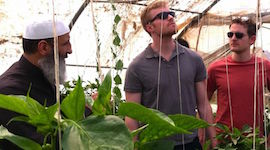
WDI began sponsoring international MAP projects for Ross in 1992, the year after they began, and have funded and provided faculty advisers for about 225 projects in the 24 years since. WDI President Paul Clyde said MAPs are “one of many tools available to pursue our mission” to develop knowledge and capability that improves the effectiveness of firms and social welfare in emerging economies.
“We’re using it in specific initiatives as a way of building relationships and developing solutions in the field with our partners,” he said. “For us, MAPs aren’t an isolated event, they are part of a longer-term relationship.”
WDI Senior Research Fellow Ted London said MAPs not only benefit students and sponsoring organizations, but also faculty members who advise the projects. It is a valuable way to keep in touch with multiple organizations, understand their latest successes and roadblocks, and think more broadly about solutions.
“I enjoy MAP so much, in part, because it gives me the opportunity to listen and learn,” said London, who also is vice president of WDI’s Scaling Impact Initiative. “These are often organizations we have worked with for many years and it’s great to have another reason for a frank and in-depth engagement.”
Each MAP project requires analytical rigor, critical thinking, and teamwork from the students. Teams of 4-6 students spend seven weeks exclusively working on their MAP projects, including 3-4 weeks in the field. Sponsors receive top-notch deliverables and data-driven recommendations from the team.
After learning about their projects and conducting research in the classroom for several weeks, the students then spend three to four weeks working alongside their project sponsors in the field.
Clyde, who served as an adviser to his first MAP team in 1998 while on the faculty at Ross, said the student projects are a “fun way to teach.”
“Something always comes up that’s an illustration of a point made in their core courses,” he said. “I distinctly remember times when you could see the lightbulb go off and they suddenly understood the concept because they were in that setting, they were living it in the field.”
WDI’s Education Initiative recently began deploying MAP teams to help further its mission of identifying and sharing new ways to enhance management education in emerging markets. This past winter, two MAP teams worked on entrepreneurship projects in Kosovo and Morocco, and one team examined e-learning at a major technical university in Georgia.
“MAP teams allow us to offer our education partners in-depth strategic guidance and for us to be able to consolidate learnings across projects and thereby identify needs, trends, and best practices in management education,” said Amy Gillett, vice president of the Education Initiative. “The projects we’ve sourced related to entrepreneurship education are helping us develop new models and tools to share with a global audience through WDI’s new Entrepreneurship Development Center for emerging markets.”
London, who has been a faculty adviser to about 50 student teams since joining WDI in 2004, called MAPs a “virtuous cycle” that benefits students, WDI’s partners, and the institute’s research.
MAPs embed students with an organization, whether it’s a nonprofit or a corporation, and apply what they have learned in school to help solve an issue the organization is facing.
“They’re solving real problems and understanding the context,” London said “They’re on the ground 3-5 weeks so they have a chance to get acclimated and then really get engaged.”
Clyde said MAPs also are an opportunity for students “to learn how to work in a team setting, to test out their leadership skills, and learn about other cultures.”
Benefitting Organizations, Influencing Students
Allie Schachter was a member of a MAP team that worked with a company interested in rolling out an active learning platform in an emerging market context. Managed by WDI’s Education Initiative, Schachter and her team embedded with the Stockholm School of Economics in Riga, Latvia. Schachter said she enjoyed applying what she had learned in the classroom to a real-world business problem. (Watch a video of Schachter talking about the MAP project below).
“My MAP experience solidified and contextualized many of the concepts discussed in class, which was an incomparable educational experience,” she said. “It was a great opportunity to work with a group on a very large and involved project. Throughout the course of our project, we honed our ability to work together, delegated tasks to one another, and navigated difficult conversations and challenges together.
“It was a really great opportunity to gain experience working for and with others. I will certainly carry those experiences forward when working with teams at work and in future classes.”
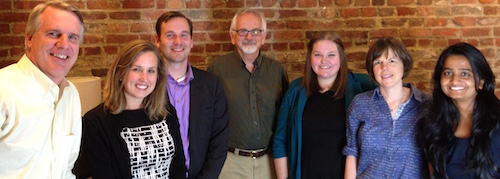
Perry Samson, center, poses with WDI President Paul Clyde, left, WDI Vice President of the Education Initiative Amy Gillett, second from right, and MAP team members.
Perry Samson, the Arthur Thurnau Professor in the Department of Atmospheric, Oceanic, and Space Sciences at the University of Michigan, developed the learning platform and enjoyed working with the MAP students to see how his product performed in an international setting. He called it “invigorating” and a “wonderful interaction” with the students, who were “thinking more deeply about all these things.”
“They thought of a number of things I didn’t think of,” he said. “They provided good insight on what drives adoption of technology in education and identified a number of suggested process changes.”
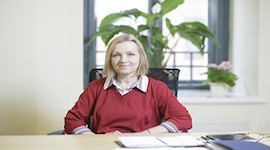
Diana Pauna
Diana Pauna, former pro-rector of the Stockholm School of Economics in Riga, found the project very useful for her university. She and her colleagues and students valued the opportunity to interact with a highly engaged team of MBA students from the University of Michigan.
“The project was extremely successful and a good learning experience for us,” she said.
London said because the MAPs are sourced with WDI partners, he and others are able to structure a good project that challenges students and benefits the organization.
“MAPs are of real value to the partners,” he said. “They do come back year after year. It’s a pressing issue they’re very keen to solve. Generally they have great outputs and create a substantial amount for the partners. That’s the reason we have a lot of repeats over the years.”
London and Clyde said MAPs can impact organizations for years to come, and can be life changing for students. London said MAP projects give students “an opportunity to see how the majority of the world lives and transacts, and it is something I believe they will carry with them the rest of their lives.”
He said one of the pleasures he gets from traveling with the students is watching them grow from the experience. Some students are committed to working internationally after graduation and have already traveled overseas. But others who will likely live and work in the U.S. when their MBA studies are complete still want to work internationally at least once.
“This isn’t what they are going to do with their life but it is something they want to experience,” London said. “We take them places and expose them to things they might not necessarily ever be exposed to. When we’re in Uganda, we’re not necessarily staying in the capital city. When we’re in Benin, we’re out in the bush.
“You can see the trepidation in some of them before they leave, and a sense of confidence when they get back,” he said. “And a whole new awareness of this world.”
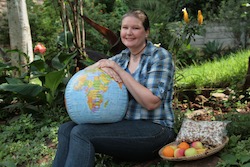
Former WDI MAP team member and WDI summer intern Patricia Griffin.
One student whose MAP experience changed her career path was Patricia Griffin, who was certain she would work for a U.S. automaker in a domestic car plant after getting her MBA. But she decided to join a WDI-sponsored MAP team headed by Clyde and that would work with a Uganda hospital.
Clyde remembers the team functioned without electricity for the first two weeks of its four-week stay. He said it was tough on the team but Griffin was energized by her experience and instead of heading to the auto plant now lives and works full time in Kenya.
“Questioning my assumptions and taking nothing for granted has become a basic mode of operation for how I conduct my career and life,” Griffin said of her time in Uganda. “That’s a direct result of the MAP experience.”
(Click here to watch Rustam Sengupta’s Nov. 30 classroom presentation.)

(Find out more about the about the Boond technology in the company-produced video below):
Sengupta was invited to speak by WDI Senior Research Fellow Ted London, who was introduced by a former U-M student. Sengupta was aware of the base of the pyramid (BoP) work London and WDI have done over the years and was eager to connect.
“In getting to know Rustam and his enterprise, Boond, what has struck me is both the innovation in their technology and the learning process the leadership team has enabled to build their business model,” said London, who also is vice president of WDI’s Scaling Impact Initiative. “They are putting together a very interesting model to address a major challenge – providing energy in rural India – and they are now focused on taking this scale. Rustam is very open about sharing his learnings and the challenges ahead, which should make this a terrific interactive session and learning opportunity. I am delighted he is here from India to share with us”
The title of Sengupta’s talk is, “Scaling Enterprise with Compassion – Energizing Rural India One Village at a Time.”
He has a master’s degree in Electrical Engineering from the University of California, Irvine and an MBA from INSEAD. He has worked for Standard Chartered Bank in Singapore, Deloitte Consulting in the U.S., and ICOS Vision Systems in Belgium. He founded Boond in 2010.
In India, about 94 percent of those living in urban areas have electricity compared with 67 percent of people living in the rural parts of the country. An estimated 304 million people do not have access to electricity, the most of any country in the world.
London said Sengupta’s talk at Ross has a lot to offer for students. For those interested in working internationally in the field, “he has a lot of interesting lessons about success, about challenges, about what works and what doesn’t work.”
For students thinking about starting their own social enterprise, London said Sengupta “will certainly share the struggles and the excitement of building your own enterprise.”
And for those interested in clean energy solutions, Boond’s distributed model “has a chance to scale, and that could have implications in the developing world and the developed world,” London said.
In an article published in the November 2016 issue of ISE Magazine, WDI’s Ted London and Colm Fay discuss how standardized frameworks can help create sustainable businesses for the base of the pyramid in developing countries.
This article is provided with permission of the Institute of Industrial and Systems Engineers from the November 2016 issue of ISE, Copyright©2016 Institute of Industrial and Systems Engineers. All rights reserved.
The co-founder of a start-up venture in South Africa that aims to save the honey bee will share how he designed the initiative to have economic, social and environmental impact as part of the WDI Global Impact Speaker Series. The talk begins at 5 p.m., Nov. 16 in room R2230 at the Ross School of Business, and is free and open to the public.
(Click here to watch Madison Ayer’s Nov. 16 classroom presentation.)
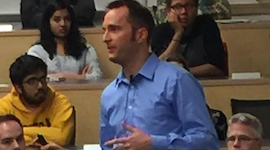
Madison Ayer, who has led several social ventures in Africa, including Honey Care Africa and Farm Shop, will discuss what he learned from those enterprises to launch Mbuyu Group, a large-scale honey bee conservation initiative. Mbuyu Group is working with South African National Parks to protect some of the world’s most critical honey bee ecosystems and strengthen the bee population. The group also hopes to become one of the largest global producers of organic honey.
Ayer has been featured in the WDI speaker series in the past. Last year, he talked about Honey Care Africa and Farm Shop, two ventures in Kenya that serve those living at the base of the pyramid.
Honey Care Africa provides smallholder farmers with beehives and harvest management services. In addition, it guarantees a market for the beekeeper’s honey at fair trade prices, helping to provide a steady, consistent source of income.
Farm Shop recruits and trains franchisees who then independently operate community-level, agro-dealer shops that supply smallholder farmers with seeds, fertilizers, tools, veterinary medicines and other items to improve crop yields.
In his 2015 talk, Ayer discussed the challenges that come with integrating low-income producers and consumers into the supply chain, including poor infrastructure, security concerns, informal regulations, and high costs. But if successful in overcoming these hurdles, Ayer said it can lead to long-term competitive advantage and positive economic impact on communities across the supply chain.
Watch Ayer’s 2015 presentation here and his interview with WDI Senior Research Fellow Ted London below:
In addition to his previous talks, Ayer also has engaged with WDI’s Scaling Impact Initiative and the Performance Measurement Initiative (PMI).
As part of a project funded by the German development agency GIZ, WDI studied the landscape of BoP facilitators in the sub-Saharan Africa region. The Scaling Impact initiative conducted field visits to Ethiopia and Kenya – including to Honey Care Africa and Farm Shop.
WDI’s Performance Measurement Initiative team also conducted a qualitative impact assessment in 2012 to identify Honey Care’s impact in alleviating poverty on children age eight years and younger, and developed a case study as part of the series entitled Focusing on the Next Generation: An Exploration of Enterprise Poverty Impacts on Children. The goal of the series, funded by the Bernard Van Leer Foundation, was to gain a greater understanding of the ways in which businesses in emerging markets impact young children’s lives and the potential to optimize impact on children.
Additionally, WDI Publishing also produced a popular teaching case study on Honey Care Africa that examined the business’s transition from obligating farmers to maintain their own hives to providing hive management services. The case also explored ways to enhance this new model, including strategies to reduce side selling. It was written by London and Heather Esper, senior program manager of PMI.